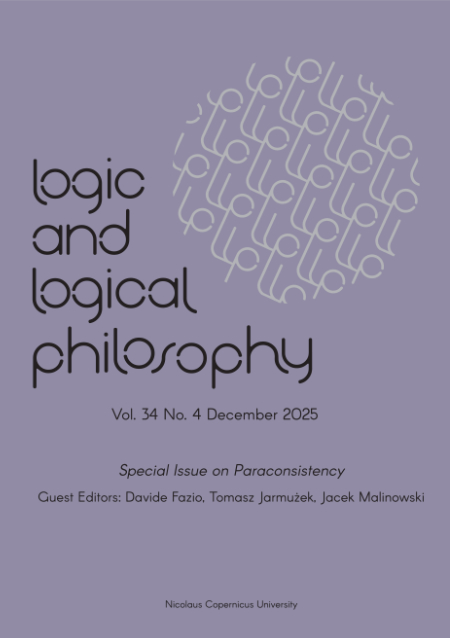What is the Principle of (Non-)Contradiction, Precisely? The Struggle at the Dawn of Formal Logic
DOI:
https://doi.org/10.12775/LLP.2024.026Keywords
the principle of non-contradiction, history of logic, Christine Ladd-FranklinAbstract
The principle of contradiction, or non-contradiction, is traditionally included as one of the three fundamental principles of logic, together with the principle of identity and the principle of excluded middle. There is a consensus now regarding the shape of the principle of contradiction in modern formal logic. However, a deeper look at the history of its formulation reveals a much more complicated picture. We trace some of such developments from the beginning of the twentieth century when all sorts of formalisms were proposed, and even the name itself was up for debate. Our focal point is the proposals made by Christine Ladd-Franklin, which we describe against the background of other attempts at the time.
References
Baldwin, James M., 1901, Dictionary of Philosophy and Psychology, vol. 1, London, New York: The Macmillian and Co.
Baldwin, James M., 1902, Dictionary of Philosophy and Psychology, vol. 2, London, New York: The Macmillian and Co.
Béziau, J.-Y., 2018, “Is the principle of contradiction a consequence of x2 = x?”, Logica Universalis, 12: 55–81. DOI: https://doi.org/10.1007/s11787-018-0188-5
Boole, G., 1854, An Investigation of The Laws of Thought on Which are Founded the Mathematical Theories of Logic and Probabilities, London: Walton and Maberly, Cambridge: Macmillan and Co.; reprinted, New York: Dover, 1958.
Burris, S., 2022, “George Boole”, The Stanford Encyclopedia of Philosophy (Spring 2022 Edition), E. Zalta (ed.). https://plato.stanford.edu/archives/spr2022/entries/boole/
Chwistek, L., 1906, “O axiomach”, PhD Thesis, Uniwersytet Jagielloński, WFII 505.
Corcoran, J., 2003, “Aristotle’s Prior Analytics and Boole’s Laws of Thought”, History and Philosophy of Logic, 24 (4): 261–288. DOI: https://doi.org/10.1080/01445340310001604707
Couturat, L., 1905a, Les Principes des Mathématiques: avec un appendice sur la philosophie des mathématiques de Kant, Felix Alcan, Paris.
Couturat, L., 1905b, L’Algèbre de la logique, Collection Scientia, No. 24, Gauthier-Villars, Paris.
Couturat, L., 1914, The Algebra of Logic, L. Robinson (transl.), The Open Court Publishing Company, Chicago and London.
Couturat, L., 1918, Algebra logiki, B. Knaster B. [transl.], J. Łukasiewicz [ed.], Koło Matematyczno-Fizyczne Słuchaczów Uniwersytetu Warszawskiego, Warsaw.
de Laguna, T., 1912, “Opposition and the Syllogism”, Journal of Philosophy, Psychology and Scientific Methods, 9 (15): 393-400.
Frege, G., Begriffsschrift, A formula Language, Modeled upon that for Arithmetic, in J. Van Heijenoort (ed.), From Frege to Gödel: A Source Book in Mathematical Logic, 1879–1931, Harvard University Press, 2002.
Green C., 2004, “The Hiring of James Mark Baldwin and James Gibson Hume at the University of Toronto in 1889”, History of Psychology, 7 (2): 130–153. DOI: https://doi.org/0.1037/1093-4510.7.2.130
Gottlieb, P., 2023, “Aristotle on Non-contradiction”, The Stanford Encyclopedia of Philosophy, E. Zalta and U. Nodelman (eds.). https://plato.stanford.edu/archives/win2023/entries/aristotle-noncontradiction/
Kneale, W., and M. Kneale, 1962, The Development of Logic, Oxford, Clarendon Press.
Ladd-Franklin, C., 1890, “Some proposed reforms in common logic”, Mind 15: 75–88. DOI: https://doi.org/10.1093/mind/os-xv.57.75
Ladd, C., 1879, “The Pascal hexagram”, American Journal of Mathematics, 2 (1): 1–12.
Łukasiewicz J., 1908, “Application documents for funding from The Osławski Fundation”, PAU 326/08.
Łukasiewicz, J., 1910, O zasadzie sprzeczności u Arystotelesa. Studyum krytyczne, PAU.
Łukasiewicz, J., 2020, “The principle of contradiction and symbolic logic”, A. Trybus and B. Linsky (transl.), History and Philosophy of Logic, 41 (2): 154-–182. DOI: https://doi.org/10.1080/01445340.2019.1693246
Łukasiewicz, J., 2021, On the Principle of Contradiction in Aristotle: A Critical Study, H. Heine (transl.), Topos Productions.
Ma, M., and A.-V. Pietarinen, 2020, “Peirce’s calculi for classical propositional logic”, The Review of Symbolic Logic, 13 (3): 509–540. DOI: https://doi.org/10.1017/S1755020318000187
Mares, E., and F. Paoli, 2019, “C. I. Lewis, E. J. Nelson, and the modern origins of connexive logic”, Organon F, 26 (3): 405–426. DOI: https://doi.org/10.31577/orgf.2019.26304
Rossi, M., 2019, The Republic of Color Science, Perception, and the Making of Modern America, The University of Chicago Press.
Russell, B., 1903, The Principles of Mathematics, The Cambridge University Press.
Russell, B., 1906, “The theory of implication”, American Journal of Mathematics, 28 (2): 159–202.
Smullyan, R., 1983, 5000 BC and Other Philosophical Fantasies, New York: St. Martin’s P.
Trybus, A., 2019, “Two of a kind. Setting the record straight on Russell’s exchange with Ladd-Franklin on solipsism”, Russell: The Journal of Bertrand Russell Studies, 39 (2): 97–192. DOI: https://doi.org/10.15173/russell.v39i2.420
Trybus, A., and B. Linsky, 2020, “On Jan Łukasiewicz’s The Principle of Contradiction and Symbolic Logic”, History and Philosophy of Logic, 41, 183–190. DOI: https://doi.org/10.1080/01445340.2019.1693245
Uckelman, S. L., 2021, “What problem did Ladd-Franklin (Think She) solve(d)?”, Notre Dame J. Formal Logic, 62 (3): 527–552. DOI: https://doi.org/10.1215/00294527-2021-0026
Wilson, E. B., 1908. “Review: L’Algèbre de la Logique, par Louis Couturat; Symbolic Logic and its Applications, by Hugh MacColl; The Development of Symbolic Logic by A. T. Shearma”, Bull. Amer. Math. Soc., 14 (4): 175–191. DOI: https://doi.org/10.1090/S0002-9904-1908-01573-8
Xu, Fangzhou, forthcoming, “An axiomatic system based on Ladd-Franklin’s antilogism”. History and Philosophy of Logic, 1–21. DOI: https://doi.org/10.1080/01445340.2023.2207245
Downloads
Published
How to Cite
Issue
Section
License
Copyright (c) 2024 Adam Trybus

This work is licensed under a Creative Commons Attribution-NoDerivatives 4.0 International License.
Stats
Number of views and downloads: 1857
Number of citations: 0







